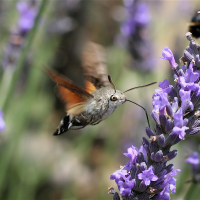This Forum will close on Wednesday 27 March, 2024. Please refer to the announcement on the Discussions page for further detail.
Are Non-native plants a cause of the decreasing biodiversity?
 elliotp981
Posts: 105
elliotp981
Posts: 105
I am wondering this as I have heard that native plants are needed so certain insects can reproduce but what does that mean for gardening? What would gardening look like with native plants only?
0
Posts
Some insects are species specific for host plants for their larvae but the adults are far less fussy about where they get ther nectar and pollen so the best thing you can do is grow a wide variety of plants to provide nectar, pollen and shelter for the adults and leave some bits of a garden wild to grow nettles and brambles and other larvae host plants.
A pond is always good for increasing diversity as is providing shelter in the forms of wood piles, leaf piles, shrubs and trees and leaving some grass unmown. Havinga compost heap and mulching the soil to feed its natural organisms will also increase fertility and biodiversity.
Or we could be interested, curious and learn about the science of things.
Is that what you wanted to know?
Gardening in Central Norfolk on improved gritty moraine over chalk ... free-draining.